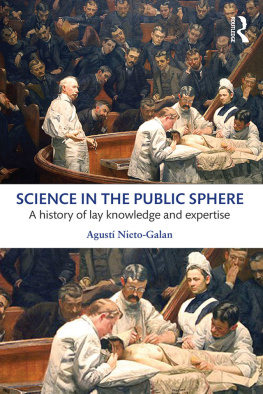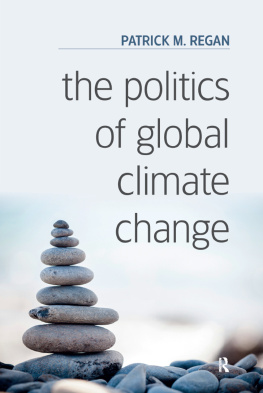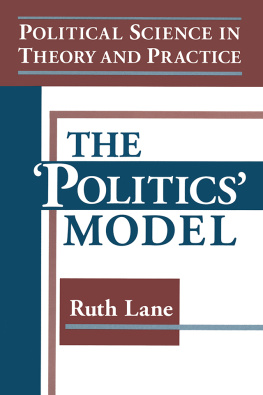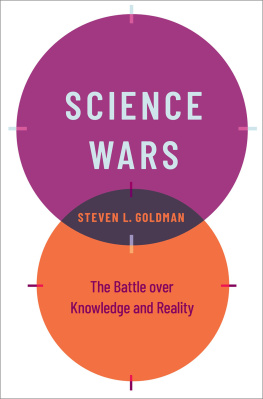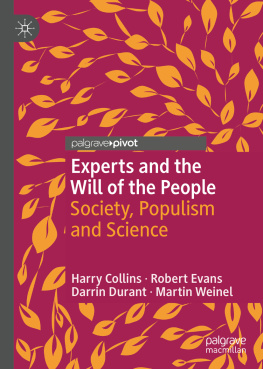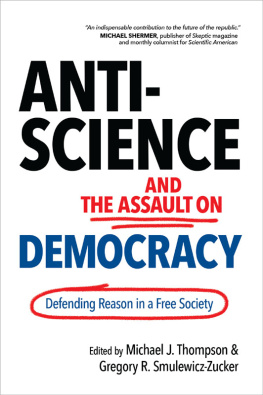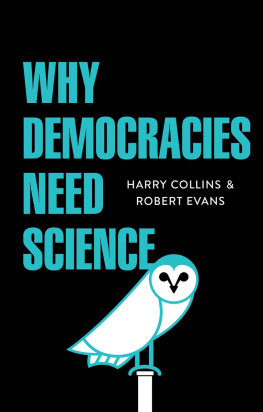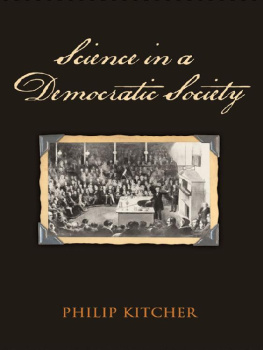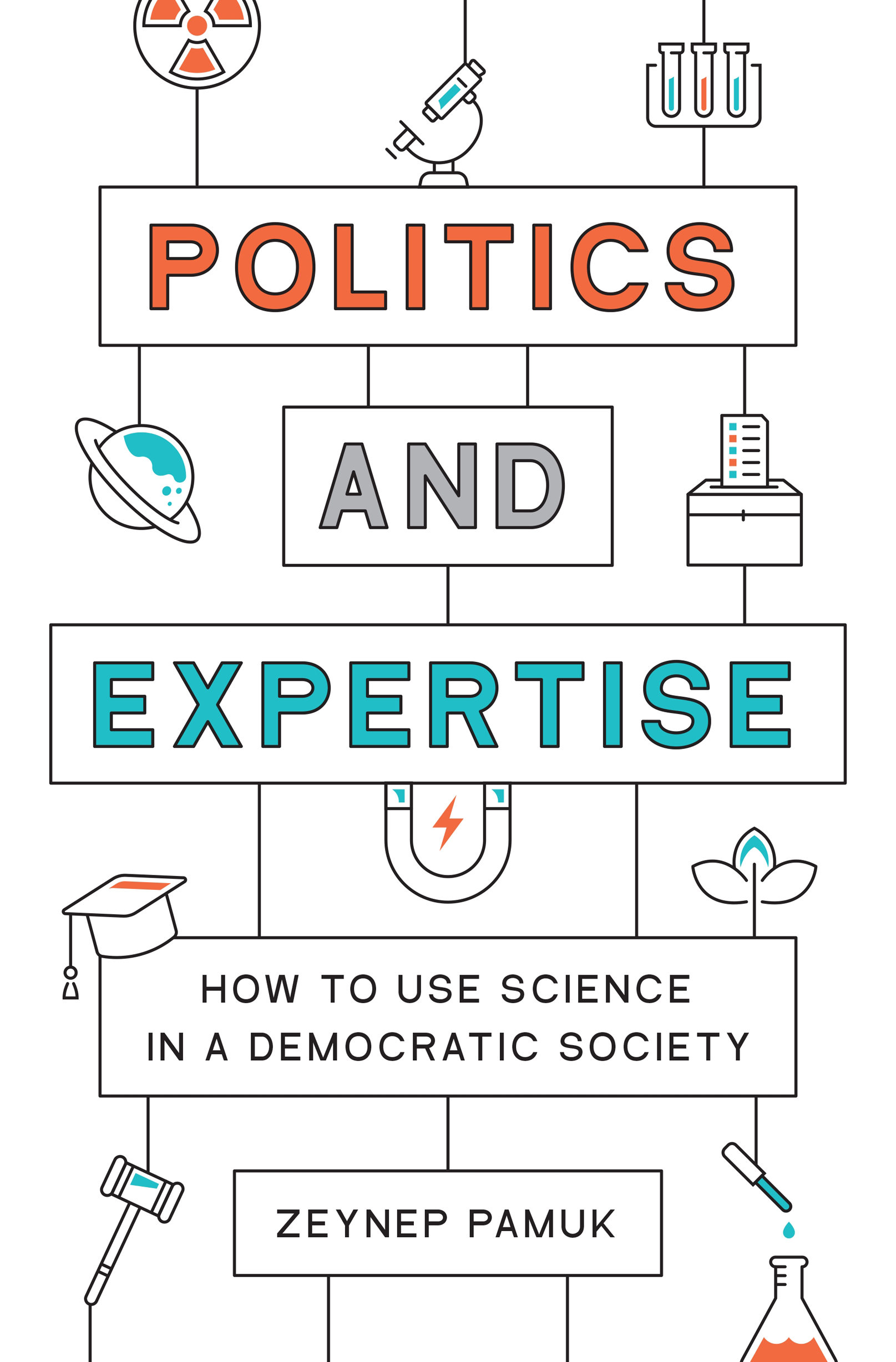POLITICS AND EXPERTISE
Politics and Expertise
HOW TO USE SCIENCE IN A DEMOCRATIC SOCIETY
ZEYNEP PAMUK
PRINCETON UNIVERSITY PRESS
PRINCETON & OXFORD
Copyright 2021 by Princeton University Press
Princeton University Press is committed to the protection of copyright and the intellectual property our authors entrust to us. Copyright promotes the progress and integrity of knowledge. Thank you for supporting free speech and the global exchange of ideas by purchasing an authorized edition of this book. If you wish to reproduce or distribute any part of it in any form, please obtain permission.
Requests for permission to reproduce material from this work should be sent to
Published by Princeton University Press
41 William Street, Princeton, New Jersey 08540
6 Oxford Street, Woodstock, Oxfordshire OX20 1TR
press.princeton.edu
All Rights Reserved
Library of Congress Control Number: 2021944419
ISBN 9780691218939
ISBN (e-book) 9780691218946
Version 1.0
British Library Cataloging-in-Publication Data is available
Editorial: Matt Rohal
Production Editorial: Nathan Carr
Jacket/Cover Design: Karl Spurzem
Production: Erin Suydam
Publicity: Alyssa Sanford and Charlotte Coyne
Copyeditor: Cindy Milstein
Jacket/Cover Credit: M. Style / Shutterstock
To my parents
It would not only be foolish, but downright irresponsible to accept the judgment of scientists and physicians without further examination.
PAUL FEYERABEND, SCIENCE IN A FREE SOCIETY
The rational layman will recognize that, in matters about which there is good reason to believe that there is expert opinion, he ought (methodologically) not to make up his own mind.
JOHN HARDWIG, EPISTEMIC DEPENDENCE
CONTENTS
- xi
ACKNOWLEDGMENTS
THIS BOOK BEGAN as a dissertation project, and would not have been possible without the unfailing support and critical scrutiny of my dissertation committee. Nancy Rosenblum infused the project with her intellectual energy, asked sharp questions, and gave the soundest advice at crucial moments. Richard Tuck taught to me to think creatively, read widely, keep an open mind, and develop a nose for theoretical puzzles. Eric Beerbohm directed me to the most relevant literatures and provided critical suggestions. Dennis Thompson stepped out of retirement to lend his knowledge and experience to the project. They all believed in this project from the start, imagined what my ideas could become before I did, and encouraged me to follow my arguments to their conclusions, however radical. Their wisdom, kindness, and generosity remain my inspiration. I am also greatly indebted to Frances Kamm for teaching me how to think clearly, Peter Hall for introducing me to Thomas Kuhn, and Danielle Allen for invaluable advice on writing.
My ideas were much improved over the years by conversations with and suggestions from Jacob Abolafia, Adriana Alfaro Altamirano, Avishay Ben Sasson-Gordis, James Brandt, Jonathan Bruno, Greg Conti, Leah Downey, Michael Frazer, Jonathan Gould, Natalia Gutkowski, John Harpham, Madhav Khosla, Suzie Kim, Jack Knight, Tsin Yen Koh, Monica Magalhaes, Alison McQueen, Julie Miller, Lowry Pressly, Rob Reich, Michael Rosen, Jacob Roundtree, Wendy Salkin, Alicia Steinmetz, Aleksy Tarasenko-Struc, Don Tontiplaphol, Beth Truesdale, and George Yin.
As a postdoctoral fellow at Oxford, I found a welcoming political theory community and shelter from the uncertainties of the academic job market. I am deeply grateful to Ccile Laborde for mentorship, advice, and inspiration during this crucial period as I was finding my feet after graduate school. Sophie Smith and Amia Srinivasan offered the perfect combination of incisive feedback, personal advice, and friendship. Ccile Fabre read the whole manuscript and suggested a number of changes that significantly improved it. Many colleagues and friends at Oxford read parts of the book, offering valuable comments and questions. Special thanks are due to Samuel Bagg, Teresa Bejan, Udit Bhatia, Paul Billingham, Daniel Butt, Tae-Yeoun Keum, Nikolas Kirby, Joseph Lacey, Maxime Lepoutre, Daniel Luban, David Miller, Alex Prescott-Couch, lise Roumas, Jay Ruckelshaus, Zofia Stemplowska, Anthony Taylor, Jonathan Wolff, and Annette Zimmermann. I am grateful to Walter Mattli and Maggie Snowling for their personal support and for cultivating a supportive intellectual environment at St Johns College. Desmond King, Melissa Lane, Annabelle Lever, Lois McNay, Philip Pettit, and Laura Valentini provided encouragement at critical junctures.
A manuscript workshop at St Johns College improved the book immeasurably. I would like to thank Simone Chambers, Michael Frazer, Alfred Moore, Nicholas Southwood, Kai Spiekermann, and audience members for feedback that struck just the right balance between critical and constructive. It was humbling to see that scholars I barely knew were willing to take the time to engage with the whole manuscript.
This project was supported by the Harvard University Department of Government, Edmond J. Safra Center for Ethics, and St Johns College, Oxford. I would like to thank them for their generous financial support and stimulating intellectual environments. Parts of this book were presented at the Duke and Princeton graduate conferences in political theory; the universities of Amsterdam, East Anglia, Leiden, Nottingham, and Sabanc; University College London; Stanford University; Blavatnik School of Government; Green Templeton College; Institute of Historical Research; Irish Philosophical Society; MANCEPT; Nuffield College; Oxford Centre for the Study of Social Justice; and Marquis Cornwallis pub in London. I would like to thank Uur Ayta, Michael Frazer, Adela Halo, Michael Hannon, Grol Irzk, Faik Kurtulmu, Cara Nine, Andrei Poama, David Ragazzoni, and Greg Whitfield for the invitations and warm hospitality, and the audiences for many questions and comments.
I completed this book as an assistant professor at the University of California, San Diego. The Department of Political Science and chair Thad Kousser were incredibly supportive and accommodating during my transition in the midst of the COVID-19 pandemic. I am grateful to Sean Ingham and David Wiens for invaluable suggestions on the whole manuscript, encouragement and support during the completion of the book, and great conversations on the methods and aims of political theory. Our biweekly Zoom meetings were a highlight of the pandemic period.
I am also grateful to two anonymous reviewers for insightful and constructive feedback. They understood the aims of the project and offered many suggestions to improve it on its own terms. I would like to thank Matt Rohal and Rob Tempio at Princeton University Press for their trust in the project, and competence and enthusiasm at every stage of the editorial process. I am delighted that this book joins their excellent selections in political theory. Thanks also to Cindy Milstein for their careful copyediting.
Parts of this book have appeared in Justifying Public Funding for Science, British Journal of Political Science (2019) and Risk and Fear: Restricting Science under Uncertainty, Journal of Applied Philosophy (2020). I thank the publishers for permission to use these materials.
A group of friends deserve special recognition for their unwavering support throughout this period. Soledad Artiz Prillaman, Madhav Khosla, Tsin Yen Koh, Zeynep Koray, Sarah Nutman, and Lale Tzmen have proved that the closest friendships can be sustaining even across continents and time zones. This book bears their imprint in ways that are difficult to express.



